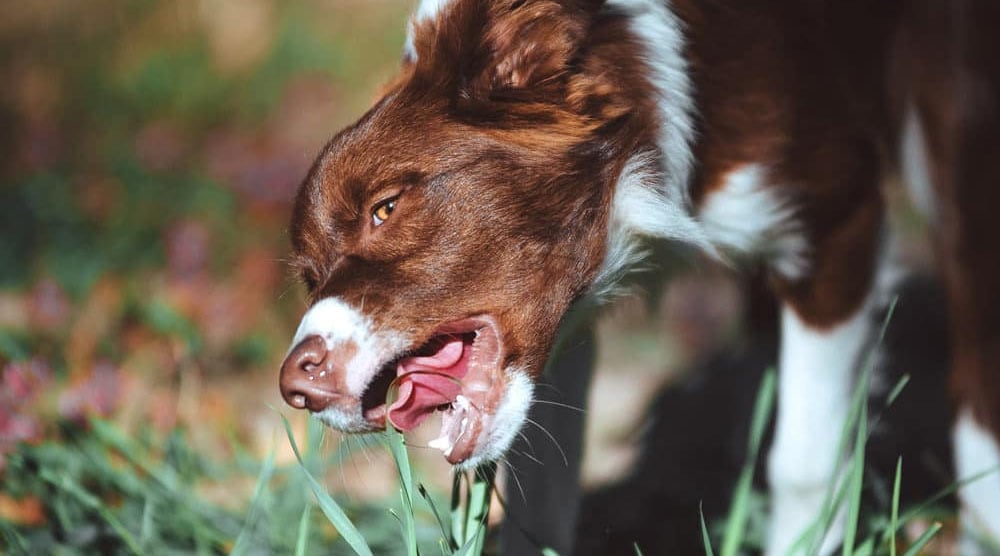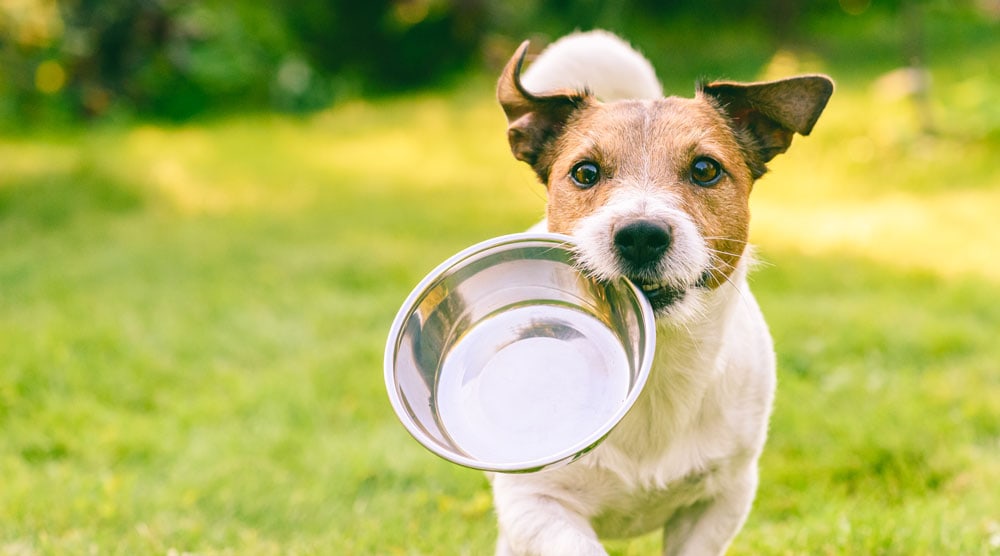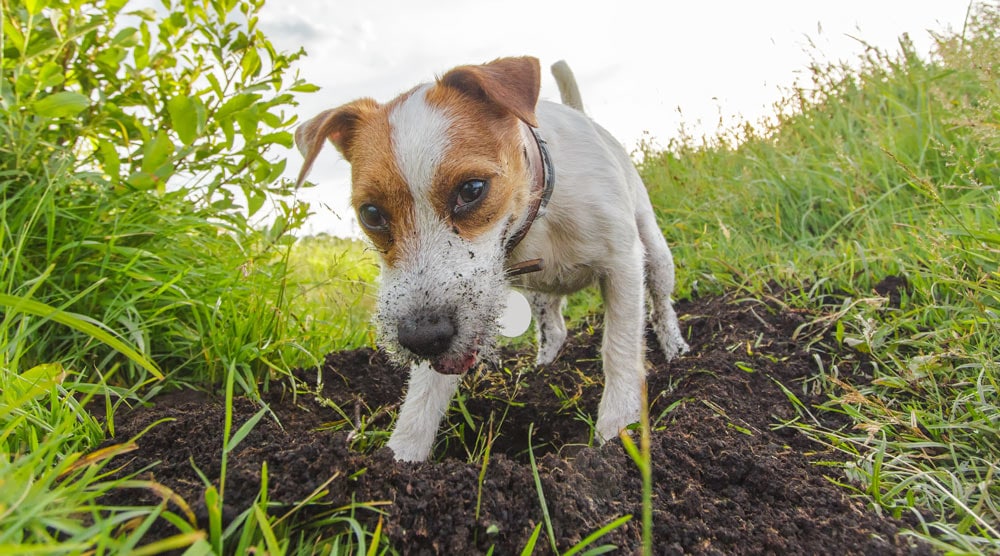Many people think dogs eat grass because they feel unwell. But is this the whole truth? Or are there other potential reasons? Read on to find out why dogs eat grass and whether you should be concerned.
Contents
The good news is that you probably don’t need to be concerned by your dog eating a few blades of grass. In fact, a large-scale study found that nearly 70% of dogs regularly eat grass.
There are several theories about this common behavior, including that it’s instinctive or that dogs just like the taste. It’s also possible, however, that eating grass is a symptom of an underlying health condition or nutritional deficiency. Let’s take a closer look at the most popular theories.
5 (Potential) Reasons Why Dogs Might Eat Grass
The truth is that we don’t know the exact reasons why dogs eat grass. There are very few scientific studies, and the ones available aren’t conclusive. Here are five of the most likely explanations, although keep in mind that the “right” theory may depend on the context.
Note: If your dog is consuming lots of grass, or repeatedly vomiting due to grass, you should contact your vet immediately.
1. Dogs Eat Grass to Make Themselves Vomit
The most common explanation for grass eating is that dogs want to throw up when they feel ill, as this makes them feel better. To achieve this, they frantically eat lots of scratchy, long grass.
Despite its popularity, the evidence suggests this theory isn’t true – at least in most cases. Eating grass can certainly make dogs throw up, but probably not on purpose.
One small scale study found that less than 10% of dogs eating grass showed signs of illness before eating the grass. Also, less than 25% of the dogs actually vomited after they ate it. If dogs want to eat grass to throw up, it doesn’t seem to be very effective!
A sudden increase in grass eating is still important to discuss with your vet though. This is especially true if you notice other signs of illness. Symptoms to watch for include weight loss, diarrhea and upset stomach, excessive drooling, lethargy, or changes in behavior.
The vet will examine your dog, and, if appropriate, perform blood tests and fecal exams to check for any underlying causes.
Even if there’s no illness, repeated vomiting caused by grass eating shouldn’t be ignored. Just like with humans, regular vomiting can cause dehydration and lethargy, and it can be damaging to the teeth and digestive system.
2. To Add Fiber to Their Diet
Another theory is that fiber-deficient dogs seek out grass to supplement their diet.
While this seems to make sense, there is little actual evidence that dogs eat grass for fiber. The study referenced earlier didn’t find any link between dogs with high fiber diets and reduced grass eating.
Of course, ensuring your dog is getting enough fiber in their diet is an important consideration, regardless of whether your dog is eating grass or not. Good sources of fiber can help ensure your dog has healthy bowel movements, aid digestion, and help your dog feel fuller for longer.
If you’re unsure whether your dog is getting an appropriate amount of fiber, speak to your vet or a qualified canine nutritionist.
3. Boredom
Dogs that aren’t getting enough physical or mental stimulation may resort to surprising ways to keep themselves entertained. Grass eating is one example.
If boredom is causing your dog to eat grass in the garden, try to evaluate whether he needs more physical exercise and mental enrichment. Increased enrichment won’t just help reduce the grass eating habit, but can improve your dog’s happiness and prevent other problem behaviors.
Aside from stimulating daily walks, providing your dog with a selection of puzzle feeders and treat dispensing toys can be a great way to keep him mentally engaged in the home. Training sessions can also tire out your pet and strengthen your bond.
If you have a particularly active dog, they may enjoy taking part in competitive dog sports, such as agility, flyball,or scent work trial clubs.
Tip: If you’re struggling for inspiration, why not check out our list of 24 fun indoor activities for dogs.
4. Grass is Tasty
Some dogs may just enjoy the taste of grass. This simple explanation is generally considered to be the most likely reason for this strange habit.
My dogs usually start to eat grass during the spring months, when the fresh shoots are appearing. They don’t tend to do it at any other time. Of course, this is just anecdotal, but other dog owners seem to back up this theory too.
You may notice that some dogs only eat specific varieties of grass. Again, this is likely because they prefer the taste.
Don’t forget that dogs are instinctive scavengers who will eat a wide variety of things. If they’ll happily eat a rotting carcass or fox poop, it’s just as possible that they enjoy the texture and taste of grass.
Side note: Eating non-food objects, including grass, is known as “pica.” This can be a potentially serious condition, which is why it should always be discussed with a vet.
5. Dogs Instinctively Eat Plants (Including Grass)
A 2006 study found grass in 74% of the dropping samples collected from wolves in Yellowstone National Park. Wild dogs also eat plants and grass, so it’s possible that domestic dogs have retained this instinct.
It’s also been theorised that wild dogs eat grass as a natural anti-parasitic, as the roughage may help rid them of worms contracted from other animals or soil. Most domestic dogs won’t need to worry about parasites like this, especially if they are up to date with worming treatments, but the instinct could remain.
One study even showed that younger animals seem to eat grass more frequently than older ones. This could be because they haven’t yet developed strong immunity against internal parasites.
Is Eating Grass Dangerous or Unhealthy for Dogs?
Grass isn’t toxic for dogs. Some varieties could cause your dog to vomit, however, especially if they eat too much in a short time.
There are also situations when eating grass could be dangerous. Herbicides and pesticides, for example, are commonly used to maintain lawns, and these can be highly toxic for dogs.
Grass may also be covered in hidden fecal matter. There’s a risk that your dog could pick up intestinal parasites from other dogs, livestock, or wild animals from grass eating. This is just one of the reasons why it’s important to keep up regular worming treatments.
It’s also worth being mindful of which other plants are nearby if your dog is eating grass. While grass is non-toxic, some weeds and other plants can be harmful.
Conclusion
Grass eating seems to be a normal behavior for dogs and usually isn’t something to panic about. Providing the grass is untreated, it’s not toxic for dogs and unlikely to cause harm.
With that said, repeated vomiting due to grass eating is something that should be discussed with your vet. You should also seek veterinary advice if your dog’s grass eating suddenly increases or is accompanied by other symptoms.




